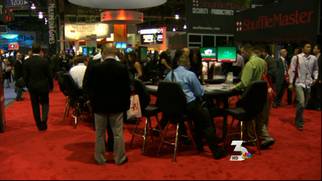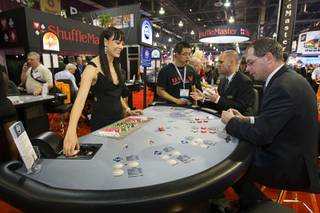Gaming expo draws industry leaders

Viewing video requires the latest version of Adobe's Flash Player
The Global Gaming Expo features dozens of panel discussions and debates on the industry's hottest topics.
While the legalization of online poker isn’t a done deal, some companies have already gone to work developing business models for the eventuality.
Some are even looking at the prospect of online sports wagering, even though most observers believe poker is the only game that has a chance for legalization anytime soon.
In a panel at the Global Gaming Expo on Tuesday, a panel of experts outlined strategies companies are taking so that they’re ready when federal legislation legalizing online play is approved.
“Getting up and running fast will be the key to some companies’ success,” said Melissa Blau, director and consultant for iGaming Capital, a London-based investment group that is consulting for Las Vegas-based Bally Technologies.
There’s plenty of work to do between now and when an Internet gambling bill becomes law. Companies must obtain a gaming license, develop game software, establish networks, secure financing and begin marketing.
While most of the major industry players have started establishing partnerships with companies that have experience with Internet gambling, some took a big risk forging partnerships early.
Alliances with companies named in indictments issued by the U.S. Southern District of New York against PokerStars, Full Tilt Poker and Absolute Poker could come back to hurt their partners.
Some major casino companies like MGM Resorts International already have gotten a taste of the online environment by offering free-play games through European partners. Caesars Entertainment earlier this year received permission from the Nevada Gaming Commission to partner with 888 Holdings in Great Britain.
Consultants have gone so far as to estimate which U.S. states would produce the largest gross gaming yield in a regulated environment.
H2Capital projected that the annual take would be $2.3 billion in California, $1.1 billion in Texas and New York, $1 billion in Florida, $700 million in Illinois, $660 million in Pennsylvania, $500 million in Massachusetts and Ohio, $490 million in New Jersey and Michigan and an average of $200 million in the rest of the states.
Panelists also said licensed companies have started exploring how they can cross-market their offerings between online and terrestrial casinos. They’d have to consider if and how they would integrate their existing loyalty programs.
Would a player who wagered online get the same rewards as a player betting in a casino? Companies also will learn about online player behavior by tracking Internet play.
Panel moderator Michael Caselli, editor of iGaming Business magazine, said even if the federal government approves the legalization of online poker, he expects many players to continue to bet sports illegally on the Internet through offshore companies.
He also suggested that if Internet poker were successfully regulated, there could be a push to move lotteries into the online space and that compacts between multiple states, similar to those negotiated for Powerball drawings, would have a wider audience online.
